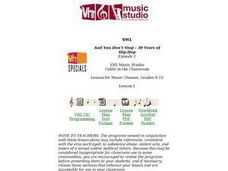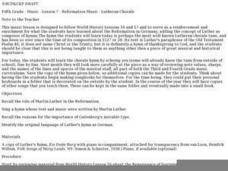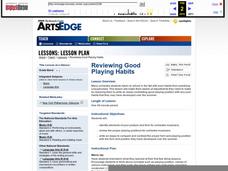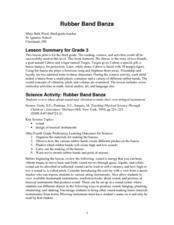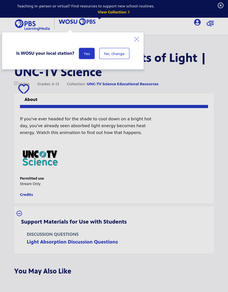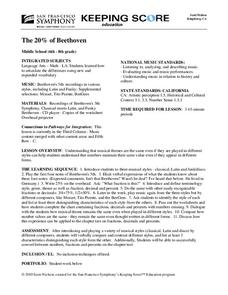Curated OER
Introduction to Music of the Civil Rights Era
Pupils summarize the major events of the Civil Rights Movement. They examine leaders such as Martin Luther King, Jr. and Malcolm X and what they did for the movement. They also listen to music from the Civil Rights Era and their functions.
Curated OER
Using Music and Poetry to Teach Science
Students learn and review science concepts through creative activities and songs.
Curated OER
Music: Cut Time
Sixth graders examine the concept of cut time prior to a band performance. After observing a DVD of a snare drum performance, they determine if the piece is in 2, 3, or 4 time. Finally, they play solos that are recorded and analyzed.
Alabama Learning Exchange
Illustrate A Song
Middle schoolers listen to various selections of music, discussing the interpretations of the song. They create a picture illustrating the feelings, mood, and message the music conveys.
Curated OER
And You Don't Stop-30 Years of Hip-hop
Students identify the musical genre of Hip-Hop and make a connection with other styles of music. A time line of musical styles is developed and discussed.
Curated OER
Musical Mysteries
Pupils explore the components of sound and how it can be represented visually. A trip to a circus and a walk through a magical forest are used to encourage visualizations and creative thinking.
Curated OER
Movement and Music: An Introduction to Slavery
Students create a slavery timeline. They identify key leaders in the anti-slavery movement. Students are asked what they can recall about slavery. They review the following vocabulary words slavery, spirituals, abolitionists, and...
Curated OER
Louis Armstrong Hot Five
Students investigate the history and development of jazz by studying the Louis Armstrong Hot Five. They listen to music and define how Armstrong strengthened the concept of the solo as a part of jazz. They complete guided listening lessons.
Curated OER
No Title
Third graders assess how to read and write rhythmic notation in music. They explore the concepts of whole, half, quarter, eighth, dotted lines, extended pentatonic, diatonic and major/minor modes. Symbols along with additional...
Curated OER
Fifth Grade Music: Reformation Music, Lutheran Chorale
Fifth graders explore the chorale hymn by echoing a Lutheran chorale tune line by line. They examine the reasons for the importance of Gutenberg's movable type and the role of Martin Luther in the Reformation.
Curated OER
Rhythm In Motion
Sixth graders work independently and with a partner to demonstrate proficiency of steady beat, meter and basic note values while creating written rhythmic patterns for class performance. State and National Standards are addressed.
Curated OER
Reviewing Good Playing Habits
The string section of your school orchestra can get a proper form make-over by incorporating this lesson. They reestablish proper playing form, posture, and sound as they compose an essay on how to maintain good playing habits during...
Curated OER
Rubber Band Banza
Third graders review ideas about sound and vibration to make their own stringed instrument. They review what a pictograph and bar graph are. Pupils conduct a survey within the classroom to choose the four favorite string instruments and...
Curated OER
Introduce Vocabulary: Charlie Parker Played Be Bop (Raschka)
Get in touch with Charlie Parker's jazz beats as learners explore new words in Chris Raschka's onomatopoeic book Charlie Parker Played Be Bop. Scholars are acquainted with some musical terminology before they hear these terms in the...
Curated OER
Romanticism 1800's
Kant and Goethe. Shelley, Wordsworth, Lord Byron, and Keats. Goya, Gericault, and Delacroix. Beethoven, Schubert, and Chopin. Romantic literature, art, and music are the focus of a presentation about the European Romantic Movement of the...
Curated OER
Formal versus Informal Language
Engage in an activity that focuses on the concepts of formal and informal language use. Middle and high schoolers compare and contrast each style by using a Venn diagram that includes some examples. They read and hear a passage of lyrics...
San Francisco Symphony
Quilt Making and Copland's Rodeo
Kids make quilts as they learn about pioneer life and the concept of tempo. The Aaron Copland piece, Rodeo is used to convey rhythm and tempo in music. As the children discuss tempo and rhythm, they also discuss what life was like for...
Hawaiʻi State Department of Education
Cloud Sculpting
Dance is a fantastic way to communicate thoughts, feelings, and even science concepts. Make this activity a part of your next unit on weather and clouds. Kids will discuss types of clouds, how they look, and what they do. Then, they will...
PBS
Light Absorption: Effects of Light | UNC-TV Science
Beat the summer heat by exploring the properties of color. Scientists view a video explaining the relationship between light absorption and energy transfer using variables including intensity, time, and wavelength. A multiple-choice...
Curated OER
Chance Art: Pollock, Cage and Cunningham
Students clearly identify commonalities and differences between dance and other disciplines with regard to fundamental concepts such as materials, elements, and ways of communicating meaning.
Curated OER
Guided Reading with Jazz Baby
Jazz music and musicians are the focus of this language arts lesson. Young readers independently read the book Jazz Baby. To build fluency and independence they read silently, but are guided by directive comments from the teacher. They...
Curated OER
Patterns in Dance and Math
Students analyze how repeated body movements and shapes can represent and extend patterns. In this pattern analysis lesson, students discuss patterns in dance, math, and everyday living. Students demonstrate a dance using a sequence of...
San Francisco Symphony
The 20% of Beethoven
Compare Beethoven's fifth symphony to latin music and disco. Learners will listen to and discuss the elements found in the first part of Beethoven's composition. They'll then look for the same elements in Tito Puente and Bee Gees songs....
Curated OER
Dancing Fast, Medium and Slow
Second graders practice dance using different speeds of music and types of movement. In this dance lesson, 2nd graders view a clip of tap dancing and analyze the speed of music in coordinating with the speed of dance movements. Students...






